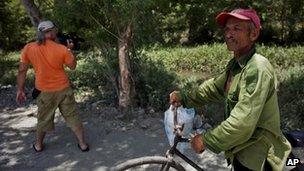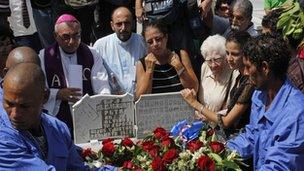Cuba: Oswaldo Paya's accident caused by 'driver error'
- Published

Officials said Mr Paya died when the car he was travelling spun on gravel and hit a tree
The authorities in Cuba say driver error was to blame for the car accident in which prominent activist Oswaldo Paya died on Sunday.
A statement by the Interior Ministry said the driver, Spanish politician Angel Carromero, was speeding when the car hit an unpaved stretch of road and spun out of control.
It said the vehicle hit a tree, killing Mr Paya and another Cuban activist.
Mr Paya's son has said that the car may have been forced off the road.
The statement said police investigations showed Mr Paya and the young opposition activist Harold Cepero were seated in the back of the car and were not wearing seat belts at the time of the crash.
Angel Carromero and Swedish citizen Jens Aron Modig, who were sitting in the front of the car, were treated for minor injuries.
<bold>'Excessive speed'</bold>
The interior ministry said the section of road where the accident happened was undergoing repairs and was full of loose gravel and very slippery.
It also quoted the two survivors of the crash and eyewitnesses.
Mr Carromero reportedly told the police that he did not recall seeing the sign alerting drivers to the condition of the road.
He said he "could not be precise as to the speed" at which he hit the section under repairs.
The statement quotes Mr Carromero as saying that he "tried to lower his speed by braking sharply and the car began to slide sideways until it hit the tree".
It also quotes Jose Antonio Duque de Estrada, who was on his bike when "the car passed me at high speed, I'm sure it was travelling at more than 100km/h".
"To my understanding, the most obvious reason for the accident that I see is the excessive speed," Mr Duque de Estrada is reported as telling the police.
Cuban investigators calculated that the car had travelled a distance of about 800km in less than eight hours.
The investigative team said that based on their analysis of the scene and taking into account the statements given by witnesses and the survivors, they calculated that the car must have been travelling at more than 120km/h.
The team said that "lack of attention controlling the vehicle, excessive speed, and the incorrect decision to apply the brakes abruptly on a slippery surface caused this tragic accident which cost the lives of two human beings".
<bold>Lingering doubts</bold>
Prior to the release of the report, Mr Paya's son had told the BBC told that his father had received many death threats and that his car may have been forced off the road.

The funeral of Mr Paya drew crowds of relatives and dissidents
The late Mr Paya, 60, is best-known as the founder of the Varela project, a campaign begun in 1998 to gather signatures in support of a referendum on laws guaranteeing civil rights.
In May 2002, he presented Cuba's National Assembly with a petition of more than 10,000 signatures calling for an end to four decades of one-party rule.
The Cuban government described Mr Paya as an agent of the US who was working to undermine the country's revolution.
But the anti-Castro opposition in the US criticised him for being too moderate.
- Published25 July 2012
- Published25 July 2012
- Published24 July 2012